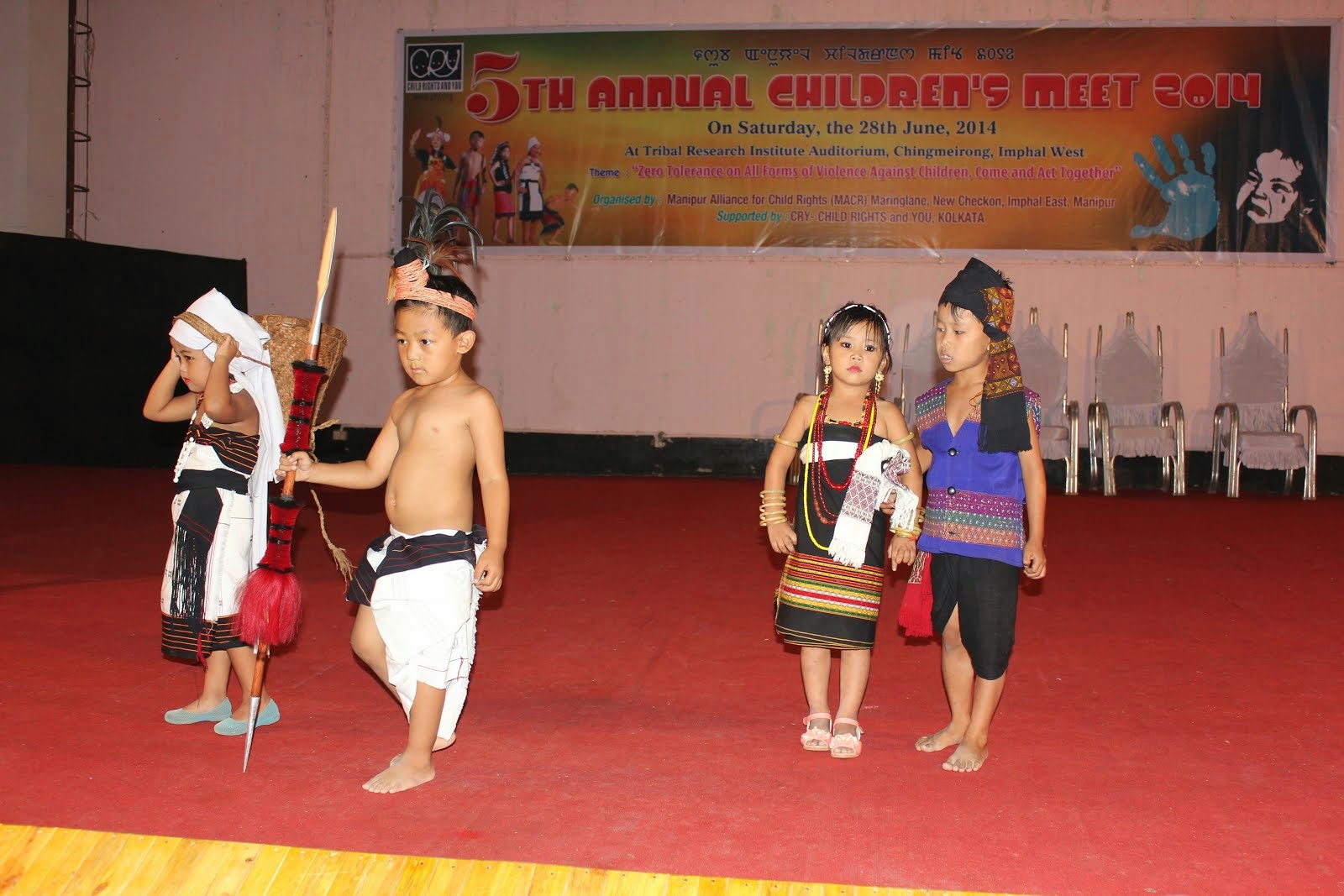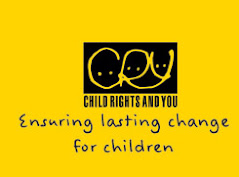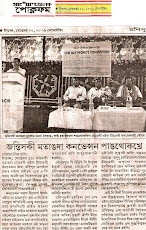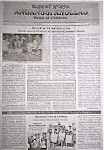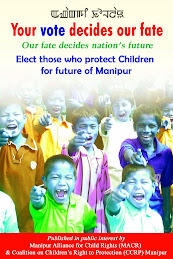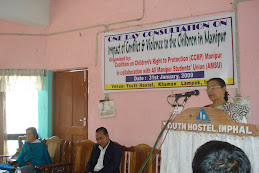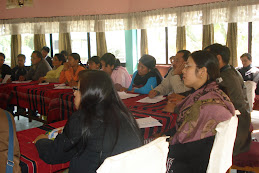Monday, July 20, 2009
EDUCATION HAMPERED BY BANDH
Translated by K. Pradip
Imphal July 17
The ongoing 120 hrs long General Strike, which begun from 15 July midnight that called by DESAM, one of the influential students’ bodies, struggling to bring about quality education and ensuring free zone in educational institutions, has hampered the normal academic activities of various schools and colleges. The students’ body called the general strike demanding the safe release of their students leaders who are still detained in judicial custody under NSA.
Activities related to education were largely affected by the general strike, despite DESAM’s exemption of education and health sector from the purview of their bandh. The incessant incidents of killing, bandh and strikes in the state have been thwarting the endeavors that strives to make education a free zone.
Though the education was exempted, majority of the students of various government schools were unable to attend their schools, as transport system which is the common means of going to their schools, was totally crippled due to the bandh. Besides, those students used to go by private vans too, could not attend schools as fuel for the vans was out of market.
When newsman of Ireibak daily visited certain government schools today, a scanty attendance of students below 20 per cent of total number of students was witnessed in most of the schools. The principal of C.C. Hr. Secondary School at Sanjenthong Mr. Nongalei said, not even one third of the students of the schools did not attend school. Since maximum students of govt. schools were hailed from remote villages they faced a big problem to attend the school. Many teachers also failed to attend. An irreparable lost is imminent for students who missed the classes. He further appealed the concerned ones that very concept of making education a free zone should be translated into real practice.
Mrs Padma the principal of Tamphasana Girls Hr. Secondary School stated that around 100 students attended school, though her school has more than 1000 students. “As we could not afford transport facilities to these students, the absentees were the real losers ” she lamented. Some students also commented not resort to call bandhs as far as possible. They felt sad as many of their classmates were unable to attend schools.
“Out of 800 students only 30 of them attended today. However, only 10 attended class yesterday”, stated by Mrs S. Khomdonbi the principal of Johnston Hr. Sec. School. As majority of the students studying in govt. schools belonged to poor families living at remote places, they could not attend schools during bandh days, she said. Since they could not afford to have private tuition bandh and blockades affect their educational career at the most. Bandh and general strikes must be stopped if quality education and a free zone in educational institutions were to be realized. Though education is being exempted during bandhs by the organization who calls the bandh, it hampers education indirectly that shatters the dream of quality education and free zone.
Saturday, July 18, 2009
India : End Manipur Killing - A Report by Human Rights Watch
The situation in Manipur is nothing less than a breakdown in the rule of law. Repealing the Armed Forces Special Powers Act would help to put an end to the abductions, torture, and killings, and help restore people's confidence in the government.
Meenakshi Ganguly, South Asia researcher at Human Rights Watch.
(New York) - The Manipur state government in northeastern India should act to end a cycle of unpunished violence, including killings, by security forces and armed groups, Human Rights Watch said today.
Human Rights Watch said that urgent action is needed by the Indian government to support this process by repealing the Armed Forces (Special Powers) Act, which has facilitated serious security force abuse for many years. A government-appointed review committee recommended the repeal in 2004, but the government has yet to act.
"The situation in Manipur is nothing less than a breakdown in the rule of law," said Meenakshi Ganguly, South Asia researcher at Human Rights Watch. "Repealing the Armed Forces Special Powers Act would help to put an end to the abductions, torture, and killings, and help restore people's confidence in the government."
Local human rights groups have documented several killings in Manipur in recent months in which the killers are alleged to be members of the security forces. The Special Powers Act gives members of the armed forces broad authority to search, arrest, and shoot-to-kill - and protects them from prosecution. The culture of violence perpetuated by this law has become so deeply rooted that the police now routinely commit the same kinds of abuses long practiced by the army and state paramilitary forces.
In several cases, security forces allegedly robbed and killed people, but then claimed that the deaths resulted from "encounters" - shootouts with armed groups. On the morning of June 20, 2009, for example, Waikom Kenedy and Thokchom Samarjit disappeared on their way to an educational institution in Imphal, Manipur's capital. That afternoon, their families learned that both had been killed by Manipur police commandos. The police admitted to the killings, but claimed they occurred during an armed encounter. The relatives believe that the men were robbed of their cash and a heavy gold chain, and then killed.
On January 14, Naorem Robindro left his home with cash to pay a rent deposit, but never returned. His family recovered his body from the morgue, where the police had left it, claiming he was a militant. A joint team of police and members of the paramilitary Assam Rifles said Robindro was killed in an armed encounter. The family believes he was killed for the cash he was carrying and a gold ring and chain, all of which were missing from his body.
On November 7, 2008, Ajit Singh and Yumna Binoy Meitei set out with the equivalent of over US$4,000 in Indian rupees to buy business materials. When they failed to come home, relatives went to check two bodies that a joint team of police and members of the 39th Assam Rifles alleged were militants killed in an encounter. The families identified the bodies as those of the two men, whose money was missing.
On December 20, Mohammad Islamuddin was carrying the equivalent of nearly US$1,000 in cash to purchase construction materials for his house, when he failed to return home or answer his mobile phone. The next morning, newspapers reported the killing of two unidentified militants by the police. One proved to be Islamuddin; the second was his friend, Mohammad Azad, who had gone along to help with the purchases. The money was missing.
"The security forces have a long history of faking ‘encounters,'" said Ganguly. "The central government should order an independent investigation into these killings."
In a September 2008 report, "These Fellows Must Be Eliminated," Human Rights Watch documented human rights abuses by all sides in Manipur, where close to 20,000 people have been killed since separatist rebels began their movement in the 1950s. The title of the report is a quote from the Manipur police chief, who told Human Rights Watch that many of the militants were not political fighters but petty extortionists or criminals who should be "eliminated." In this environment, members of the security forces apparently believe that it is acceptable to kill suspects instead of pursuing prosecutions through the legal system.
"Unexplained killings attributed to the security forces or armed groups have become common in an increasingly lawless Manipur state," said Ganguly. "The state and central governments can restore some public confidence by getting serious about investigating and prosecuting these killings and ensuring that justice is done."
Nearly 30 armed groups are estimated to operate in Manipur. Some have such a strong hold over Manipuri society that ordinary citizens have been forced to build alliances with them to ensure protection from others. The government's failure to end the lawlessness has also encouraged corruption and common crime. The armed groups routinely extract "taxes" from people, even including government officials, and carry out abductions for ransom.
The armed groups have also been implicated in killings. On the morning of February 13, Thingnam Kishan Singh, an administrative official with the Manipur government, left Imphal with other staff members for a meeting in the adjoining Ukhrul district. He failed to turn up for the meeting, answer calls, or return home the following day as scheduled. On February 16, Singh's family was informed by the authorities that he and his colleagues had been abducted by the National Socialist Council of Nagaland (IM), an armed group. The next day, the bodies of Singh, his driver, Aribam Rajen Sharma, and his associate, Yumnam Token Singh, were recovered by the authorities. According to his relatives, the NSCN (IM) had earlier made extortion demands on Singh, and has claimed responsibility for the killings.
"Five decades of rights violations by the government security forces don't justify the killings and extortion by armed groups in Manipur," said Ganguly. "These groups share the blame for Manipur's lawlessness."
Thursday, July 9, 2009
Union Budget 2009-10 bypasses India’s children once again
Source-http://www.ifp.co.in/shownews.php?newsid=3252
By Satya Gopal DeyKolkata, July 8, 2009:
“Social sector, in particular the children of India, have not got any significant attention in this year’s Union budget,” stated Brinda Karat, member of Parliament (Rajya Sabha) and member of polit bureau CPI(M). On being apprised about the press release on the aspect of budget for children brought out by CRY (Child Rights and You), in a telephonic interview with the Kolkata correspondent of Imphal Fress Press, Karat stated that, “UPA government is going to table Right to Education Bill without appropriate budget allocation.”According to CRY, the Union Budget 2009-10 shies away from key allocations to education, health, and child protection. Despite being plugged as citizen-friendly, scratching the surface of the budget throws up three key shortfalls. Public expenditure on schooling falls short for the number of children entering school-going age every year. No new money allocated to realise the proposed Food Security Act. Without a holistic approach to food, there is no guarantee that children will grow up food secure. The promise to universalise ICDS has been long-standing and while the increased allocation to Rs. 6,705 crores for the ICDS is welcome, the impact on the ground can take years to materialise. In the context of ICDS as raised by CRY, Brinda Karat reminded about Supreme Court’s verdict. In short, the actual increase in expenditure on children is just Rs. 5,100 crores: approximate 14 percent increase that will hardly cover the number of children added to the population each year.“Children are forty percent population of our country, each and every budget should have special emphasis and increased percentage of share for the children,” stated Shatha Sinha, chairperson of the National Commission for Protection of Child Rights (NCPCR).“Most developed countries in the world like the USA, UK and France spend around 6-7 percent of their national budgets for public education and health, while India allocates around 3 percent for education and around 1 percent for health. When we emulate first-world economic growth, we must realise that economic growth is meaningless unless it reaches 70 percent of India’s poorest,” said Dipankar Majumdar, director of development support of CRY. “For a country that is firmly on a growth path, a decrease in public spending on education and health from 1999-2000 to now, is regressive,” Majumdar further added.The total allocation for school education and health is well below the need for 10 percent of GDP to be allocated to school education and health. Public spending on basic rights is not just good policy, but also good economics, feels Majumdar, since an educated, healthy India will enable a robust economy.“Given the UPA’s people-friendly appearance, an example of which is the increased outlay for the National Rural Employment Guarantee Act (NREGA), we expect the government to live up to its potential,” said Majumdar. “The Central government’s allocation for 40 percent of India’s population - its children - remains at 5.09 percent and it is clear that state budget allocations will not make up for the needs,” emphasised Majumdar.According to CRY, the government’s Aam Aadmi image needs to be backed up by not just allotment, but by a push on utilization.The Comptroller and Auditor General (CAG) had rapped the government in early 2009 for SSA funds that were returned unutilised. Allocations, not backed by usage, remains an empty promise. Not just sanctioning new ICDS centres, but making them operational and staffed by trained personnel. Even the better developed states like Gujarat and Maharashtra have been unable to operationalise all the sanctioned anganwadis.Spending on school education is the same as last year, Rs. 13,100 crores for Sarva Shiksha Abhiyan, Rs. 8000 crores for Midday Meals Spending on food security and health not increased.According to Brinda Karat, there is an overall decline in the percentage of share for children. In the 14th Lok Sabha Karat was an important member of Parliamentary forum for children. “The 15th Lok Sabha would also reconstitute this forum,” Karat stated in her concluding statement.
Child rights NGOs unhappy with budget allocation for education, health
“Though there are many steps in the right direction, in areas critical to children’s rights, education and health and protection, the budget allocations are much below par. CRY has been calling for 10 percent to be spent on health and education,” Majumdar told IANS.
Similarly, Arupjyoti Das, who works in an NGO focussing on primary education of slum children, said: “It’s very disappointing that despite long standing demands for increasing the total public spending on education to at least six percent of the GDP, it has not been addressed.”
“Of course, other initiatives such as easier loans to students of economically weak families is a good step. But primary education should be a priority as well,” Das said.
Nearly 300 NGOs and other grassroot organisations had come together to demand higher budgetary allocation to health and education before the budget was presented by Finance Minister Pranab Mukherjee in parliament Monday.
Oxfam India, the Indian arm of the international NGO, said the budget has failed to live up to the expectations of providing “inclusive growth and equitable development”.
Nisha Agarwal, CEO of Oxfam, said: “It is a budget focusing again on the kinds of policies and programmes that have delivered high growth during the last decade but have failed to reach the poor and minority groups, and have thus exacerbated the already high levels of inequalities that exist in India.”
“There was hardly any mention of basic education in the finance minister’s speech, which is disappointing. The national expenditure on education has remained around three percent of GDP, our public spending on health at less than one percent of GDP remains amongst the lowest in the world,” she said.
“The foundation of inclusive and equitable growth has to be a society that provides free and quality education and basic health care services to all so that the poor can also avail of the opportunities created by high growth and improve their lives and livelihoods,” Agarwal said.

